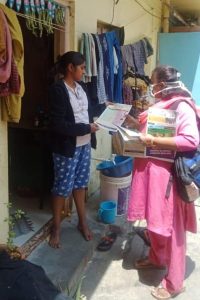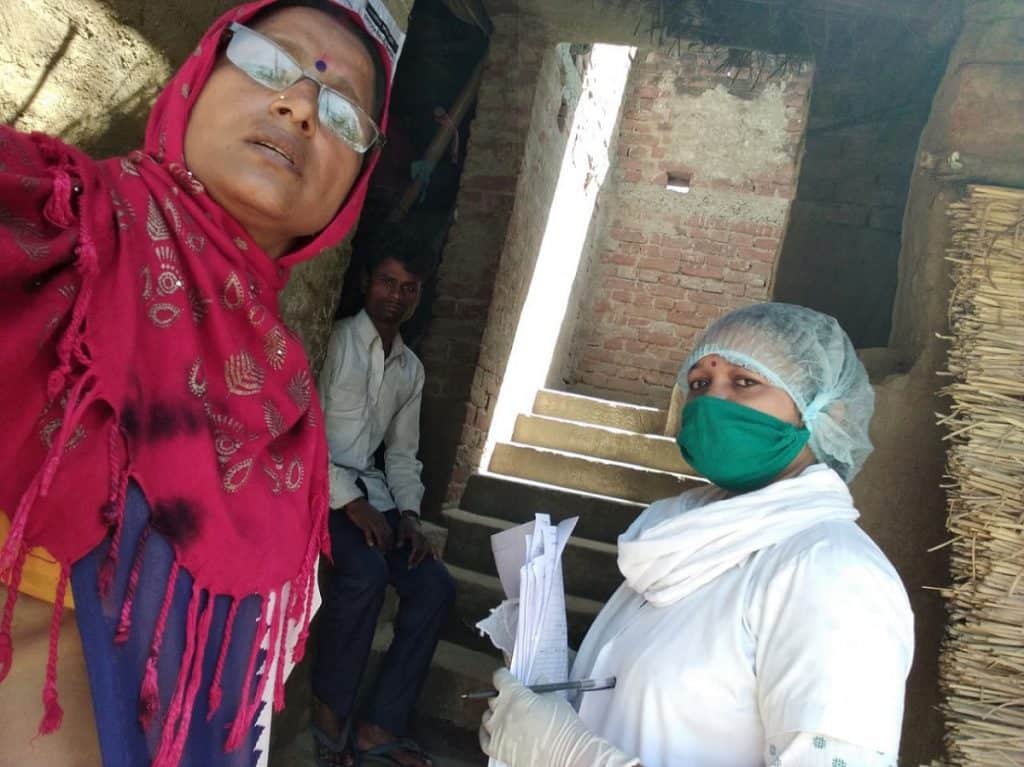“It feels like we are in a warlike situation. Soldiers fight on the border, we are fighting COVID here,” says 35-year-old Sajidha. She is an ASHA worker stationed at the Primary Health Centre (PHC) in Bengaluru’s Peenya Industrial Area. Having been on COVID-duty for the past week, she surveys 20-25 houses every day and has to reach over 2800 people in the city’s northwestern neighbourhoods.
While on surveillance duty, Sajidha goes door-to-door checking for symptoms of coronavirus. She maintains data on contacts, age and medical history of the people she surveys. She also distributes awareness pamphlets on how to stay safe during the COVID pandemic. At the end of the day, she reports to her supervisor with the data, which is then submitted to the health department.
“If I find a positive case, I help the patient get to a hospital. Their contacts need to be traced and taught how to quarantine themselves at home, so I do that. If it comes out negative, I tell people how to stay safe and advise them to stay at home” she says.
Bengaluru has at least 62 confirmed cases of coronavirus and has been declared a ‘red zone’ by the government. While on her surveillance rounds, Sajidha is most often greeted by residents without masks or any protective equipment. With new COVID hotspots emerging every day, healthcare workers like Sajidha routinely find themselves at the frontlines of the government’s strategy to deal with such COVID hotspots.
On March 24th, the Health Ministry released its micro plan to deal with the pandemic. The plan focuses on containment zones or hotspots – regions within a 3-5 km radius of residences where coronavirus positive patients have been found. In a recent update, the ministry has identified 20 existing hotspots and 22 possible ones.
The Centre’s plan offers a template that can be customized to meet the needs of different states. Regardless of region, the plan relies heavily on the fieldwork of ASHA, ANM and Anganwadi workers. In addition to caregiving work, it assigns the task of primary data collection to them, which forms the basis of field research on the COVID pandemic in India.
Many states including Karnataka, Maharashtra and Kerala have already directed healthcare workers to begin COVID duty, just like Sajidha. Meanwhile, ASHA workers in other states await orders with a sense of anxiety, as new hotspots emerge.
“The Bihar Government released a letter which directed all ASHA workers to take charge of 25 houses each. It said that they have to go house-to-house, check for symptoms and report possible cases,” says Shashi Yadav, President of ASHA Karyakarta Sangh, Bihar. However, ASHA workers in Bihar have decided not to work during the lockdown, as they haven’t received proper Personal Protective Equipment (PPE) yet.
“We were going for COVID duty earlier, but we have stopped since the lockdown. No one has got any safety equipment yet. We keep asking for it, but officials say that the stock is not there. We also have children at home and have to worry about their safety too. We sincerely do our work and would have still been doing it if the equipment was there. But if someone calls and orders from the PHC, we’ll have to go,” says Kavita Kumari, an ASHA worker in the state.
The government’s plan necessitates the use of Personal Protective Equipment (PPE) by all personnel involved in the COVID response. However, it says that “PPEs are to be worn as per the risk assessment for various categories of personnel.” Field workers, including ASHA workers, fall in the last category (lowest risk) and are required to wear triple layer masks and examination gloves. However, most ASHA workers in Bihar complain of the lack of even these basic PPEs.
“We have demanded that we get proper safety equipment from the government – mask, gloves and sanitizers. Otherwise, we can’t work. But we haven’t got a response yet. That’s why ASHA workers in Bihar have not gone on COVID duty since the lockdown. Those who are going are only tying a gamcha (cloth) over their mouths or are buying their own masks” says Shashi.
Things are better for ASHA workers in Karnataka, who have recently managed to get PPEs. However, there’s still a lot left to be desired. “I got a mask and gloves from my PHC and my officer ma’am is very supportive. She helps as much as she can. But we haven’t got sanitizers yet and these masks are not of good quality. So I ended up buying my own,” says Sajidha.
With an early spurt in confirmed patients, Bengaluru started mobilizing its healthcare workers in the first two weeks of March. However, ASHA workers received PPEs only recently. “We had requested the government to provide PPEs in the early stages, but we only got them a week or so ago, after many inquiries. Even now, there are some areas that have them and some that don’t. ASHA workers are working sincerely and if they are safe, the nation will be safe”, says Rama, State Committee member of the ASHA Union in Karnataka.
India is facing a massive shortfall of PPE kits, coveralls and masks for medical workers. According to reports, the Ministry of External Affairs ordered over 30 lakh PPE kits from Singapore and Korea this week. When the kits arrive, it remains unclear whether the safety needs of ASHA workers will be met, as they fall in the least-risk category of the government plan.
ASHA livelihoods at risk
Accredited Social Health Activists (ASHA) are not recognized by the government as employees, but are instead treated as volunteers in the public health system. Despite the rigorous work that they do, ASHA workers only receive an ‘honorarium’, which is far lower than minimum wages in states, ranging from Rs. 1000 to Rs. 7000 per month. Adding up her incentives, Sajidha receives about Rs. 4000-6000 per month.
In recognition of their importance in the coming months, the government recently announced an additional Rs. 1000 honorarium to ASHA workers for the next three months. The added incentive would be worthwhile, but only if ASHA workers were receiving their salaries in the first place.
“We still haven’t got our salaries for February, so I don’t know when and if we’ll get the Rs 1000 bonus. How are we supposed to live without a salary? I don’t have a ration card and shops are not giving credit. I am still lucky that my husband earns well and provides for my children. But so many ASHA workers are single or have husbands who don’t earn. How will they even buy masks and gloves?” says Sajidha.
For many years now, scheme workers have been taking out rallies, demanding fair wage and employment. Most recently, Bengaluru was painted pink, when thousands of ASHA workers from all over Karnataka marched to Freedom Park in January. However, years of protesting has only managed to add small increments to their honorariums, despite persistent demands for minimum wage and dignified employment.
Mistrust and fear
To make matters worse, there have been reports of threats to the lives of ASHA workers on COVID duty.
“Just this past week, ASHA Manju Devi died while she was out surveying. She suddenly got dizzy and fell to the ground. She passed away after she was brought home. We still don’t know what caused her death,” says Bihar’s Shashi. Recently, an ASHA worker was assaulted in Bengaluru while surveying a neighbourhood in Sadiq Nagar.
The COVID pandemic hit India following months of intensive protests against the Citizenship Amendment Act and the devastating Delhi pogrom. Further aggravating already exposed fault lines, the response to the pandemic has also been marked by the growing stigmatization of COVID patients and an increasingly communalized narrative. At such a time of mistrust and fear, especially amongst minority groups, ASHA workers will also bear the brunt of the reaction to state surveillance.
Recognizing the threat to life for healthcare workers, the government had announced an insurance cover of Rs. 50 lakh as part of their economic relief package. However, ASHA workers see little value in it. “We heard about the 50 lakh insurance, but that’s only applicable after death. Isn’t it more important to help us while we are working and still alive? We are doing important work, shouldn’t we at least get our salaries on time, if not bonuses?” says Sajidha.
As different parts of the nation prepare for Stage 3 of the pandemic, the government’s action plan relies on the overworked, underpaid and frustrated workforce of scheme workers such as ASHA. It seems to forget that among the healthcare workers in the plan, ASHA workers themselves represent one of the most vulnerable sections – both socio-economically and medically.
According to activists, this is business as usual for the ASHA workforce of more than 10 lakh women. “It’s not just with coronavirus. All big schemes, whether it’s POLIO or COVID, rely on scheme workers. They are the ones who do the work finally. In fact, the public health system rests on their shoulders. But when it comes to acknowledgment, they are not even recognized as employees deserving a minimum wage ” says Shweta Raj, Delhi State Secretary of AICCTU.


With due regards and respect to Asha workers i have to point out that they are just doing their assigned work and adhering to a time schedule and it is being considered as basic data. Should we take it as a realtime data based on reality check? Corona pandemic is a serious issue and not like voters list check or a survey. We need a super imposed test check about veracity of such info gathered by Ashas and then make it official. Mere paper or media announcements abt lock down are not enough. If we have to get real time true picture, on a trial basis, create a special health squad, seal down two hot spots, visit every gully, conduct thorough med check up, collect meticulous info about secondary trails, check for false and misleading info, collate and create 90% accurate data for planning future control measures on a scientific basis. Otherwise, we will be simply going round and round on this mega health issue.